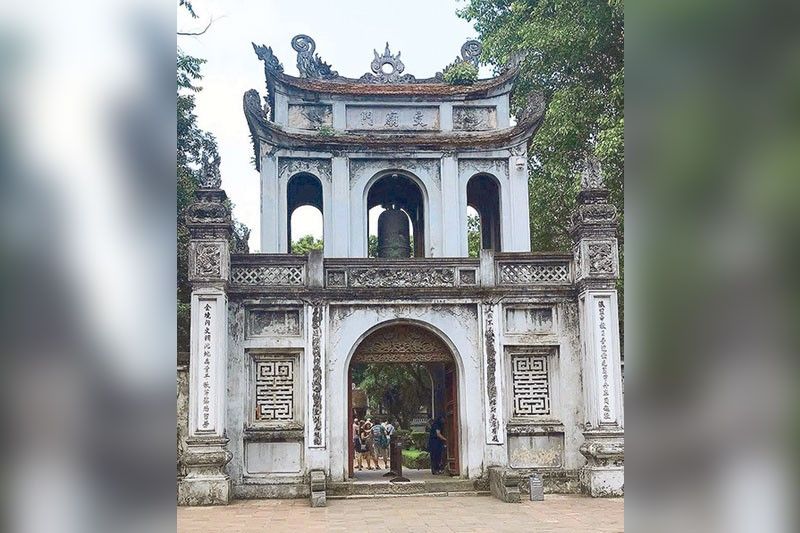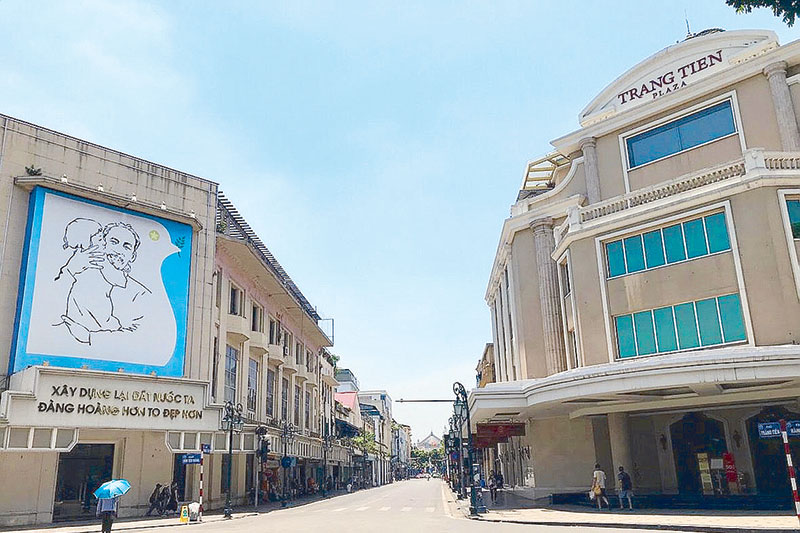Friend or ‘Pho’: A Hanoi state of mind

As the most popular street food of Vietnamese origin, pho will inevitably have regional variants, secret family recipes; and there’ll be a constant debate about which noodles, water, broth or herbs make for the best pho.
Luckily, for any visitor to Hanoi, you can try all the different types — some Hanoi restaurants and street vendors will serve the Southern-style pho — and come out a winner. Pho is Vietnam’s comfort food, affordable and ubiquitous; and it’s the friendliest way to enter the Hanoi vibe and get closer to understanding why Vietnam is playing such a winning hand in the tourism game.

The mustard-colored Presidential Palace.
As the second largest city in Vietnam, Hanoi is the capital and the gateway to much of what happens in Vietnam — and there is so much happening in the city, and in the whole country as well. If in the past, it would be Hanoi, Ho Chi Minh City and Ha Long Bay on most visitors’ Vietnam itinerary, that has changed drastically with numerous tourist sites developing all over the country, and catering to different interests and spending proclivities. At last count, there are 21 state-recognized tourist sites.

Pho, of the chicken and beef varieties.
Hoi An is a centrally located coastal town that’s “time warp” country and is reputed to be the gastronomic capital of Vietnam. Sa Pa is a mountain town in the northwest that used to be the favorite of backpackers and those looking for a rustic Vietnam, but is fast developing as the new summer playground of the moneyed tourist. And what about the Instagram frenzy surrounding the Golden Bridge on Ba Na Hills in Da Nang. For a country that only opened its doors to foreign tourists in 1997, Vietnam has been aggressive in converting its agrarian economy to a service one, with tourism as one of the primary revenue streams. In 2018, there were 15.5 million visitors to Vietnam, a close to 20 percent increase from 2017.
Spending three days in Hanoi recently, and doing the city tours, I was impressed by how organized they were, how you felt you were getting your money’s worth. They had done a good job of turning Vietnam’s rich dynastic history and colonial legacy into a past that sat well with its socialist now-being. Uncle Ho was everywhere as an inspiration and reminder of the struggle, but it was also Uncle Ho who was looking over this UNESCO City of Peace; and how right beside a mural depicting this, was the Trang Tien Plaza, home to luxury retail brands such as Louis Vuitton, Cartier and Dior.

From the top floor of a building, a view of Hoán Kiêm Lake.
The Temple of Literature is a network of structures, pagodas, ponds and artifacts that celebrates Confucius, learning, and is the site of Vietnam’s first university. The Vietnam National Museum of History chronicles the country’s pre-history, up to the 1945 Proclamation of Independence — and one sees the dynastic past, how they had to rebuff Chinese and Mongol aggressors; and how the French colonial heritage impacts on the city’s architecture and infrastructure. The Hoàn Kiem Lake is one of many that dot the cityscape but this one has a great story behind it, the legend of how a sword was restored to the Dragon King via a charmed turtle that approached Emperor Le Loi in 1428.
Everyone raves about the street food culture of Hanoi, but in a city of five million scooters and motorbikes (there are only one million cars), be prepared to be dining amidst the exhaust fumes, and seated on low plastic stools. If that doesn’t sound like your cup of tea, I would recommend Uhòa Restaurant for traditional Vietnamese cuisine, in a more comfortable setting.

Uncle Ho gazing on the home of luxury retail brands, Trang Tien Plaza.
I mentioned the 15.5 million visitors to Vietnam last year. We had 7.1 million here in the Philippines. And if you were wondering, Malaysia enjoyed 25.8 million and Indonesia had 15.8 million. Cambodia had six million, but was third in growth in the region behind Vietnam and Indonesia. And let’s not even talk of Thailand, which is on another level, with 38.27 million visitors in 2018. Am I envious? Of course I am! In Vietnam, it’s difficult to find someone who speaks English, the weather in June is oppressively hot, road safety, aggressive vendors and pickpockets are major issues the tourism industry is facing, and yet, they’re doing something right to enjoy that influx of 15.5 million tourists in 2018.
The biggest countries contributing to that influx are China and South Korea, followed by Japan, Taiwan and the US. So these are countries where we already make a presence but the greater number of travelers from those countries are choosing to head to Vietnam. Not for me to understand why or to fix the situation, but yes, I am very jealous. And yes, Vietnam was a wonderful experience.
















